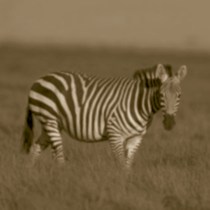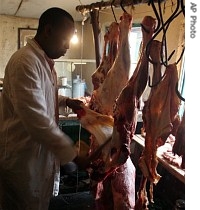-
(单词翻译:双击或拖选)
Nairobi
13 July 2007
The confiscation1 of more than 400 pounds of zebra meat destined2 for Nairobi markets is drawing new attention to the trade in illegal game meat in Kenya. As Nick Wadhams reports from our East Africa bureau in Nairobi, wildlife officials have found it nearly impossible to control the bushmeat trade, which can pose serious health risks.
 |
Officials with the Kenya Wildlife Service (KWS) say the seizure3 is part of a wider effort to crack down on the hunt and sale of game such as zebra, giraffe and buffalo4 in Kenya. Later Saturday, thirteen people were arrested in the Tsavo West National Park on poaching allegations.
 |
| Peter Njoroge slices pieces of beef from a carcass in his makeshift butchery in the Kibera slum in Nairobi, Kenya, 10 July 2007 |
"That is one thing we've been trying to send the public, because the consumption of that meat, which has not been tested essentially5, exposes the public to such diseases as anthrax and a number of these beef-oriented diseases. It is a constant threat," he said.
The bushmeat trade has been a major concern in Kenya for years. Officials say one problem is that the criminal code's punishment for poachers are not severe. That means that poachers are coming across the border from Tanzania, where anti-poaching laws are more strict. Seven of those arrested in the Tsavo West incident were Tanzanian.
And Kenya's population is growing so quickly that people come into contact with animals more often or are desperate for something to eat.
Kenya hopes to address all of those issues with an overhauled6 wildlife policy, which is set to come before parliament later this year. But KWS spokesman Kabukuru says it's hard to tell people not to stop hunting game illegally.
"The bushmeat fight has been an ongoing7 process. Our greatest challenge is one the issue of population growth, of rapid population growth," he added. "So definitely they hunt for subsistence. Even when we are putting everything in place it is very difficult to convince a hungry man that he will not eat."
One of the starkest8 signs of the extent of the bushmeat trade came in a 2004 investigation9. The London-based conservation group Born Free conducted a random10 sample of some 200 butchers in Nairobi and found that a quarter of the meat was bushmeat, while 20 percent was game meat mixed with meat from goats and other domestic animals.
 收听单词发音
收听单词发音
1
confiscation

|
|
| n. 没收, 充公, 征收 | |
参考例句: |
|
|
|
2
destined

|
|
| adj.命中注定的;(for)以…为目的地的 | |
参考例句: |
|
|
|
3
seizure

|
|
| n.没收;占有;抵押 | |
参考例句: |
|
|
|
4
buffalo

|
|
| n.(北美)野牛;(亚洲)水牛 | |
参考例句: |
|
|
|
5
essentially

|
|
| adv.本质上,实质上,基本上 | |
参考例句: |
|
|
|
6
overhauled

|
|
| v.彻底检查( overhaul的过去式和过去分词 );大修;赶上;超越 | |
参考例句: |
|
|
|
7
ongoing

|
|
| adj.进行中的,前进的 | |
参考例句: |
|
|
|
8
starkest

|
|
| (指区别)明显的( stark的最高级 ); 完全的; 了无修饰的; 僵硬的 | |
参考例句: |
|
|
|
9
investigation

|
|
| n.调查,调查研究 | |
参考例句: |
|
|
|
10
random

|
|
| adj.随机的;任意的;n.偶然的(或随便的)行动 | |
参考例句: |
|
|
|















